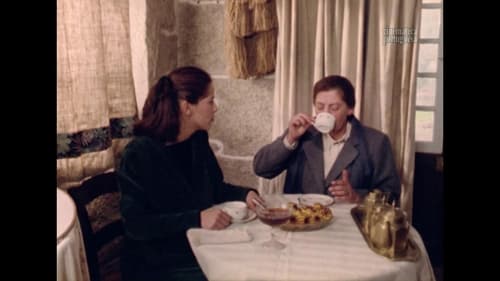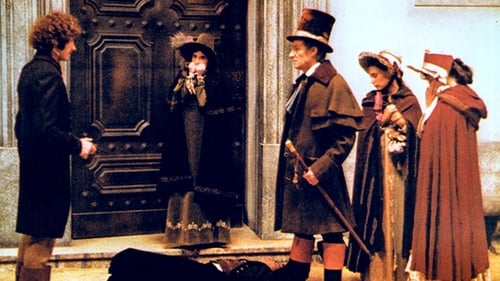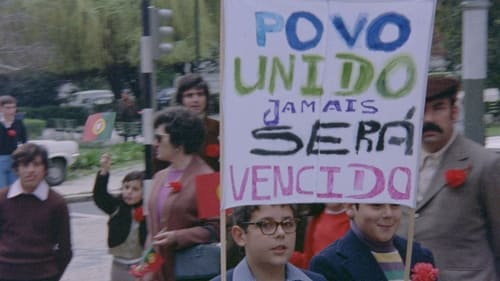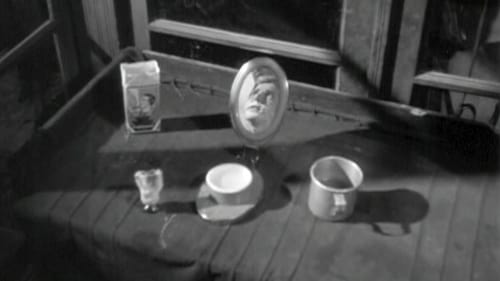
Director of Photography
Life of photographer Gérard Castello-Lopes, disciple of Cartier-Bresson.

Director of Photography
"French television came up with the idea of Se Deus Quiser (but they didn't carry it through), which consisted in inviting six European directors to describe their homeland in a film. When my friend Jacques Dercourt contacted me - he had seen Nós Por Cá Todos Bem at Cannes - I told him I like the idea a lot and I proposed a to Várzea and to my mother, that is, a confrontation between images and sound, memory and sentiment" (Fernando Lopes).

Director of Photography
In the summer of 1870, Raquel, who owns a farm, and lives secluded in her mansion with an old butler and a handful of servants, feels proud when an odd acquaintance comes by. Adriana and her daughter-in-law, Ermesinda, a very young girl, just happen to be visiting - the second time in 15 years for Adriana, and the first time for the teenager Ermesinda. The meeting seems to be pleasant, and yet, for reasons untold, there is coldness and reserve between Adriana and Raquel. Their ambiguous relationship will be revealed, when by accident old wounds are reopened.

Director of Photography
Tomás is a young teenager who fights for the leadership of a small marginal group. One night, in the world that he cannot control, his fallout leads to the death of one of the group's members. Laura, the possible witness to the crime, becomes a threat.

Director of Photography
Ofelia is the daughter of photographer Miguel and of deceased circus artist Lea. When her father is hospitalised with a nervous breakdown, she decides to find out the reason and in doing so discovers the truth about the relationship between her parents and the true fate of her mother.

Director of Photography
Pontius Branco was a climber of the economy, climbed by money like Mount Everest. aggressive businessman. His wife Bernarda felt betrayed. He replaced her for the orgies between the purchase intervals, sells and deceives. Here comes the train from 15:30 to Lisbon a coming emigrant from France with a five year old daughter in her arms and attacks Pontius in his stronghold, demanding recognition of the daughter of sin, Libertina that he had made her "bidonville» on the city of light. Bernarda hires a private detective to obtain evidence of Pontius's adultery with a curvaceous blonde, whose dream was to own butchers, fishmongers and vegetable places in a shopping center. Pontius who all deceived and this triangle (not Bermuda), weaves the web and bore's the head of the entrepreneur. A perfect luxury crime puts the police overtime. Time passes and only after the Seventh Day Mass is brought to light when the sky was given the eclipse of the moon ...

Director of Photography
Adelaide Coelho da Cunha, daughter of the founder of the newspaper "Diário de Notícias", married to Alfredo da Cunha, then director of this newspaper, and mother of José, who is 20. This educated, cultured woman, falls in love with the chauffeur, who is youger than her and from a different social background. This passion leads to confronting the established order of things and the standards of social behaviour of a wife and mother. She may at the same time be heroine and victim of her own courage in deciding to make a final break from the whole family status and run off with the chauffeur. When his wife runs off with the chauffeur, Alfredo da Cunha with the aid of some of the eminent doctors of the day, has her declared irresponsible and incapable of administering her assets, and on this pretext he has her inprisoned in a mental hospital.

Jogador de Poquer
The young girl, Antónia Margarida Castelo Branco, is handed over by her mother to Brás Telles de Meneses because of the obscure interests between rural aristocratic families in the North. Brás is a ruined man, a bohemian with a reputation for violence and erratic behaviour. Antonia’s fortune is the first sacrifice made by the young wife. Fascinated by the man who humiliates and ill-treats her, she follows him in a pilgrimage to increasingly barren lands, to increasingly less hospitable houses.

Director of Photography
The young girl, Antónia Margarida Castelo Branco, is handed over by her mother to Brás Telles de Meneses because of the obscure interests between rural aristocratic families in the North. Brás is a ruined man, a bohemian with a reputation for violence and erratic behaviour. Antonia’s fortune is the first sacrifice made by the young wife. Fascinated by the man who humiliates and ill-treats her, she follows him in a pilgrimage to increasingly barren lands, to increasingly less hospitable houses.

Director of Photography
Based on the work by Fernando Pessoa - a "message" about the destinies of Portugal - not just in isolation but looking at them as precursors and announcers of the fate of the entire planet.

Director of Photography
A story about character created by Reinaldo Ferreira (1897-1935), action reporter, mystery novelist and emotion journalist.

Director of Photography

Cinematography
Dona Elvira promises to get a job from José through the typical Portuguese wedge. In parallel, they are bizarre aspects and eccentric figures of the city life, including the tragedy of the actress Maria Alves.

Production Manager
José Pereira, a young medical graduate, meets a young and ardent Maria Eugénia. The time is the eve of the Portuguese Revolution, on 24th April 1974 and only a short time elapses between courtship and marriage. The young pair are very much in love, but José begins to have doubts about the "honesty" of such intense feelings of love, feelings which are too intense (or hot) to him . If Maria Eugénia is like this with him, will she be the same with other men?In the meantime, the Revolution takes its course. José, who previously had been persecuted because of his opposition against the old regime, now feels "left behind" and frustrated.

Director of Photography
This exaggerated mockery of crime cinema tells the story of a gang lead by "Renato, o pacíficio" (Renato, the peaceful) and their attempt to steal precious jewels from the Gulbenkian Museum in Lisbon. The weapon of choice? Bees!

Cinematography

Director of Photography

Director of Photography
In 1974, not long after the death of Portuguese dictator Salazar, who had ruled Portugal from the early '30s to the late '60s, a group of disgruntled Army officers held a coup. They were even more disgruntled when they realized how the coup was being manipulated by leftist officers to instigate genuine elections and establish a constitution for the first time in Portuguese history. Though their intent was to form a radical socialist state, circumstances prevented this, and a genuine parliamentary democracy emerged. This film explores the circumstances of a right-wing businessman during those times. The man is an old-fashioned authoritarian, whose attentiveness to the needs of his mistress, wife and son is crude where it exists at all.

Cinematography
A man finds a mansion with a strange inhabitant.

Producer
A man finds a mansion with a strange inhabitant.

Director of Photography
A story about doomed love between two people from different worlds and the impact in their lives.

Sound Editor
The Mother is one of Monteiro’s first essays on the universe of Portuguese oral culture, folktales and obscure colloquialisms. The plot revolves around a traditional tale about theft, greed, an ubiquitous mother, and the links between the worlds of the living and the dead.

Production Manager
The Mother is one of Monteiro’s first essays on the universe of Portuguese oral culture, folktales and obscure colloquialisms. The plot revolves around a traditional tale about theft, greed, an ubiquitous mother, and the links between the worlds of the living and the dead.

Cinematography
The Mother is one of Monteiro’s first essays on the universe of Portuguese oral culture, folktales and obscure colloquialisms. The plot revolves around a traditional tale about theft, greed, an ubiquitous mother, and the links between the worlds of the living and the dead.

Cinematography
In this highly theatrical TV production, Monteiro again draws on the world of folklore – and, more precisely, on the widespread sexual connotation of the pomegranate – to tell a tale of love, envy, treason and mistaken/double identities.

Director of Photography
The film follows soldiers escape and wander, talk, and drift aimlessly.

Director of Photography
With a strong documentary element, "Nós Por Cá Todos Bem" mixes professional actors with the inhabitants of a small village, telling the story of a small film crew in a village living day to day.

Director
Film directors with hand-held cameras went to the streets of Lisbon from April 25 to May 1, 1974, registering interviews and political events of the Portuguese "Carnations Revolution", as that period would be later known.

Cinematography
After her mother's death, Sofia returns from a Swiss college to her family's luxurious villa, in Cascais. Through the relashionship between her father, Henrique, and his lover Laura, she will discover the complexity, egothistic, discrete and hypocrite way of life - from which there is no escape.

Director of Photography
The Soares are a bourgeois couple, living in a good neighbourhood of Lisbon, but João, their son, is not integrating well in that pattern. He attends more political meetings than classes at the Faculty of Economy, and gets a job but that's short lived because his female boss makes him her lover. He longs for the coffee shops, and the companions of old, but he doesn't get true love from anyone.

Narrator (voice)
One of the first films that looks at the Portuguese region of Trás-os-Montes. From the mask called “careto” and the popular festival to the everyday reality.

Cinematography
One of the first films that looks at the Portuguese region of Trás-os-Montes. From the mask called “careto” and the popular festival to the everyday reality.

Director
One of the first films that looks at the Portuguese region of Trás-os-Montes. From the mask called “careto” and the popular festival to the everyday reality.

Director of Photography
Retrato social típica de un país aislado y pobre, víctima de una ideología totalitaria. "Un universo parada y opresiva rural, roto por ausencias, desacuerdos o silencios, centrado en una pareja - Maria dos Prazeres, Álvaro Silvestre. Estado civil compromiso de relaciones, que se hizo añicos por el conflicto latente de pasiones, debilidades y deseos reprimidos ". Cit:. José de Matos-Cruz en Cais do mira, ed. Portuguesa Cinemateca, 1,999.

Director of Photography
This documentary shows a typical Sunday in Mozambique's capital, tourist main attractions, an inquest in Lisbon about the perception of the people in the street about what life was like in that African colony (or, as the Government had it then, "province"), and then interviews and scenes of Lourenço Marques fishermen and a bar waitresses. African folk music and dance were used as documents and background for the text narration.



























